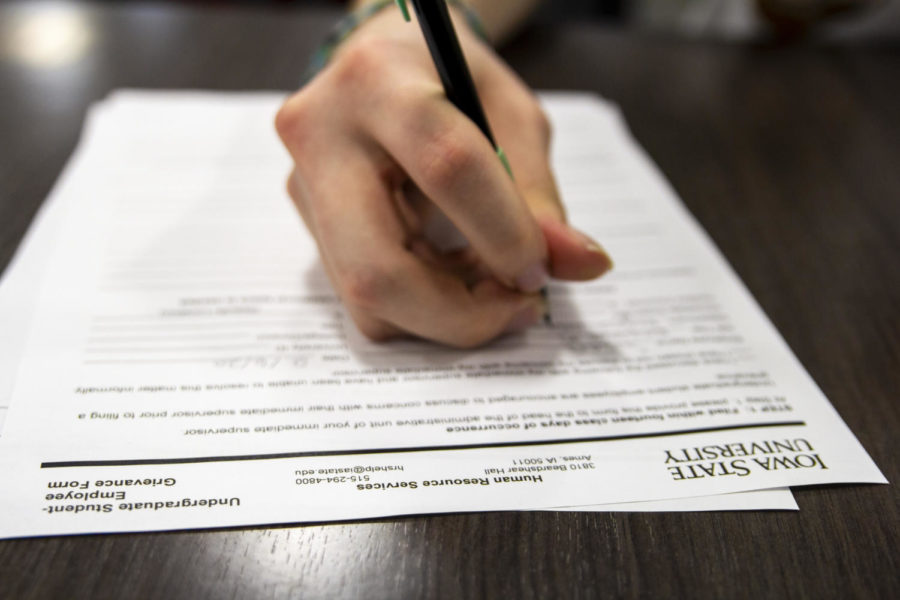Discrimination complaints allow students to voice concerns at Iowa State
Students at Iowa State who feel that they are being discriminated against can file complaint reports in a variety of ways.
February 25, 2020
For students who face discrimination at Iowa State, there are multiple ways to report the discrimination.
“Iowa State University’s primary goal is to prevent discrimination and harassment and stop such behavior if it occurs,” according to the Office of Equal Opportunity (OEO) website. “To that end, Iowa State University has adopted informal and formal processes through which discrimination and harassment complaints can be resolved.”
If someone feels that they have been discriminated or harassed based on race, color, age, religion, national origin, sexual orientation, gender identity, genetic information, sex, marital status, disability or status as a United States veteran, they may file a complaint with OEO via the multiple methods.
One way is to file a complaint via phone at 515-294-7612 or the hotline at 515-294-1222.
Another way is to file a complaint via email at [email protected].
The final way to file a complaint at Iowa State is in person at 3410 Beardshear Hall by appointment from 8 a.m. to 5 p.m. Monday through Friday.
Another way to file a complaint is through an external agency such as the Iowa Civil Rights Commission, the U.S. Equal Employment Opportunity Commission or the U.S. Department of Education Office for Civil Rights.
Iowa State has specific definitions of both discrimination and harassment.
“Iowa State University prohibits discrimination, which can include disparate treatment directed toward an individual or group of individuals based on race, ethnicity, sex, pregnancy, color, religion, national origin, physical or mental disability, age, marital status, sexual orientation, gender identity, genetic information, status as a United States veteran or other protected class, that adversely affects their employment or education,” according to the Discrimination and Harassment Policy.
Harassment is defined at Iowa State as a form of discrimination if it is unwelcome and is sufficiently severe or pervasive and objectively offensive so as to substantially interfere with a person’s work or education, according to the Discrimination and Harassment Policy.
Harassment may include, but is not limited to, threats, physical contact or violence, pranks, jokes, bullying, epithets, derogatory comments, vandalism or verbal, graphic or written conduct directed at an individual or individuals because of their race, ethnicity, sex, pregnancy, color, religion, national origin, physical or mental disability, age, marital status, sexual orientation, gender identity, genetic information or United States veteran status.
“Even if actions are not directed at specific persons, a hostile environment may be created when the conduct is sufficiently severe or pervasive and objectively offensive so as to substantially interfere with or limit the ability of an individual to work, study or otherwise to participate in activities of the university,” according to the Discrimination and Harassment Policy.
Overall the university has adopted two complaint resolution mechanisms that individuals at Iowa State may use to raise discrimination and harassment concerns — informal and formal resolution.
An informal complaint may, but need not be made before filing a formal complaint; however, once a formal complaint has reached a resolution, the same complaint cannot be brought as an informal complaint, according to the Discrimination and Harassment Policy.
Informal
The informal process of solving a complaint is through which harassment and discrimination complaints may be resolved promptly and discreetly, often through communication, education and/or mutual agreement.
Under the informal process, the complainant must bring the complaint forward, either verbally or in writing, to someone with authority over the person against whom the complaint is directed, such as a dean, professor or supervisor. The complainant can also reach out to OEO.
Options for informal resolution through OEO may include advising the complainant about methods to resolve the concern, arranging educational programs for individuals or departments, helping modify a work or study situation, mediating between the parties or intervening or arranging for a third party to intervene.
Formal
A person who wishes to file a formal complaint must do so in writing and submit it through OEO.
A formal complaint with OEO involves completing an intake form and submitting a written, signed statement describing the incident or incidents as completely as possible. Specific guidelines for the submission of a complaint may be obtained from OEO, and the complainant may visit with a staff member of that office prior to filing a formal complaint.
Once a complaint is filed with the Office of Equal Opportunity, it will be assessed and, if an investigation is warranted, the case will be assigned for investigation to a staff member or designee.
“Generally, an investigation will include interviews with the complainant or complainants, with the person against whom the complaint has been brought and with anyone else who might have information that would be helpful. Based on this investigation, the Office of Equal Opportunity and/or designated investigator will meet with the supervisor of the accused person to share findings and discuss appropriate action to resolve the complaint,” according to the Discrimination and Harassment Policy.
Other Internal Grievances
Students and employees may have concerns or complaints about their academic or work settings that may not directly involve discrimination or harassment, such as grades or office assignments, and these are addressed in other ways.
Complaints related to academic matters may be filed in accordance with the policy on appeal of academic grievances found in the university catalog. Such complaints should be brought to the attention of the instructor or the department chair.
Complaints regarding misconduct by a student may be directed to the office of student conduct in accordance with the student conduct code, published in the student disciplinary regulations.
Undergraduate student-employees may bring a grievance in accordance with the policy on undergraduate student-employee grievances.
Students with disabilities who have concerns as to academic accommodations may also proceed informally by notifying Student Accessibility Services.







